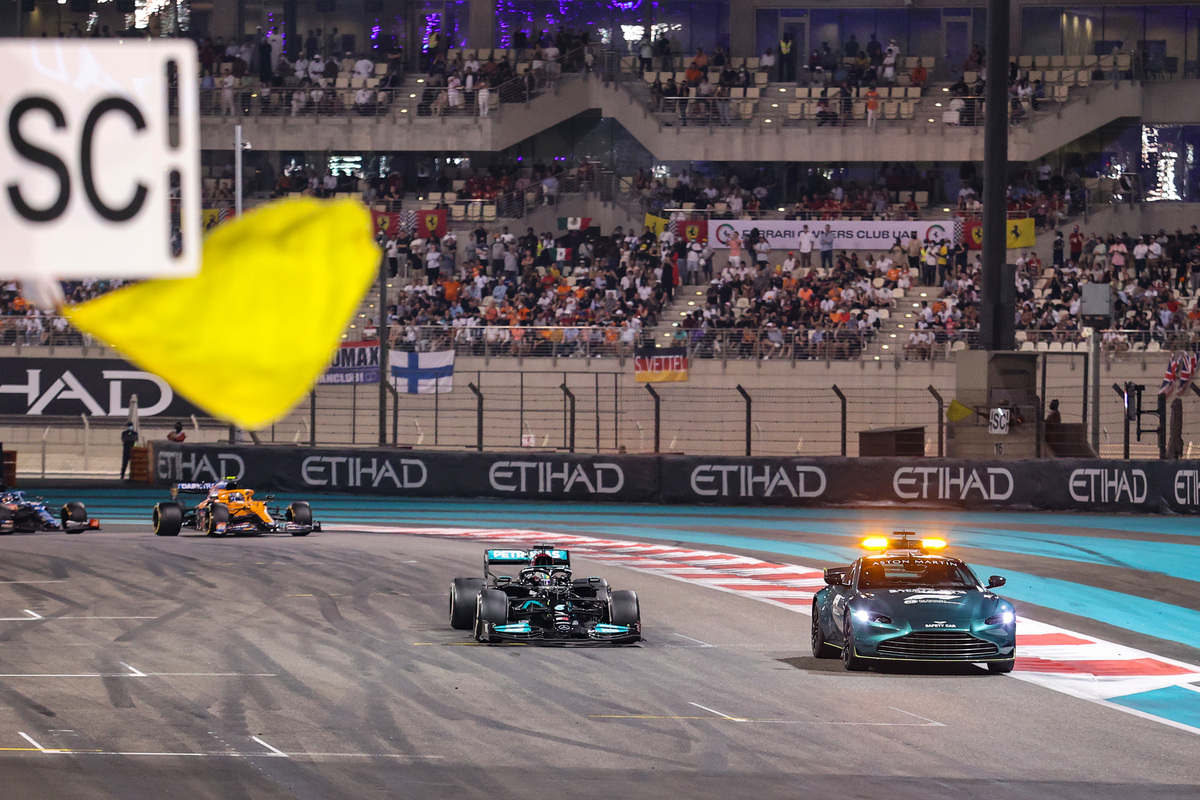

A judgement document produced by the International Court of Appeal (ICA) concerning a nearly identical scenario noted the underlying principle of “sporting fairness”, as laid out in the first article of the International Sporting Code.
While accepting there were errors made in the running of the race (and notably in the management of a Safety Car) and that it impacted the outcome, any move to change that would essentially be the greater of two evils.
As a result, the ICA ruled that the racing result should stand despite the acknowledged error.
In 2021, Max Verstappen won the drivers’ championship in controversial circumstances that centred on the handling of a late Safety Car.
Lewis Hamilton led the race, which returned to green flag conditions as the field completed its final lap.
With fresher tyres, Verstappen passed Hamilton and claimed his first world championship.
In the immediate aftermath, Mercedes announced its intent to appeal the outcome of the race, citing the incorrect procedure when dealing with lapped cars and the Safety Car restart.
However, it later withdrew its intent to appeal, presumably on legal advice.
A similar case has now been heard by the FIA International Court of Appeal which suggests quite strongly that Mercedes would have lost its appeal.
The case relates to the outcome of the International GT Open competition, which saw Team Motopark disadvantaged by the incorrect position of cars at a Safety Car restart in a race at the Red Bull Ring in September.
A convoluted process followed before the FIA International Court of Appeal got involved after two separate appeals saw the destination of the championship title change.
During those appeals, the race classification was annulled, a point the ICA noted it did not have the authority to do.
In essence, the scenario is nearly identical to that of the 2021 Abu Dhabi Grand Prix where it can be argued the decision of the race director with regards to the Safety Car influenced the outcome of the championship.
Heard earlier this month, the ICA released its grounds for overturning a previous successful appeal and thereby reinstating the race into the championship.
That resulted in Charlie Fagg and Samuel De Haan being named championship winners.
The NCA was thus wrong to refer to Articles 11.9.3.j and 11.9.3.r of the Code which respectively refer to “amend the classification” and “the decision to stop temporarily or permanently, all or part of a Competition”, in order to support its decision to cancel the Race.
The NCA and the RFEdA further refer to a decision issued on 2 April 2023 by the College of Sports Commissioners of the GT-CER which itself refers to a decision issued by the ICA in 2006. 42. The Court notes that those decisions do not refer to any specific regulation that would grant the Stewards or the NCA the power to cancel a race and, consequently, a whole classification
The Court also notes that neither the NCA in its Decision, nor the RFEdA in its written submissions, refer to any further provision that would grant such power to the Stewards or the NCA. After having thoroughly reviewed the regulations applicable to the present case, the Court did not itself find any such provision.
Based on all the above, the Court decides therefore that neither the Stewards nor the NCA had the power to cancel the Race.
On the question of the competence of the ICA to cancel the Race or annul the results of the Race 45.
Articles 10.11.1 and 10.11.2 of the JDR state that “the ICA has all the decision-making powers of the authority that took the contested decision […] In addition, the ICA may admit or dismiss the appeal, in whole or in part, and may decide to confirm, waive, mitigate or increase the penalty inflicted […] it may annul or amend the results of a competition, but it is not empowered to order any competition to be re-run.”.
It is Paragraphs 54 and 55 of the 24-page document that are of particular interest.
In the present case, it is not disputed that the Race Director did not apply Article 37.6 of the Regulations and Articles 2.10.12 and 2.10.13 of the Code, even though it was her responsibility to use the Safety Car properly as provided under Article 11.10.3.e of the Code.
On this point, the Court rejects the Appellant’s submissions according to which the Race Director did not commit a breach of the Regulations and the Code, but simply used her “overriding authority” to apply the rules on the Safety Car according to the circumstances of the Race. The Court finds that independently from all circumstances, the Regulations and the Code must be fully applied not only by the competitors, but also by the Race Officials. In other words, the “overriding authority” of the Race Director when it comes to the management of the Safety Car is not a carte blanche which would allow her to amend the result when she deems it necessary.
The International Court of Appeal also noted that the race director’s error was an honest mistake and subsequently goes on to clarify that, while that could see race results annulled or amended, in this instance, it was not warranted.
The Court decides however that, in the present case, the classification must not be annulled or amended.
It goes on to state that the ICA operates under a framework and to the principle of “sporting fairness”.
As a consequence, the fundamental principle of sporting fairness must be considered as one of the cornerstones of any action taken by the FIA, its internal organs or any legal entity subject to the Code.
Furthermore, it added:
In the present proceedings, it is undisputed that the annulment or amendment of the classification does not only have an impact on the Race as such, but also on the next races, as the classification of the Race impacted the competitors who were imposed extra handicap time penalties for the next race, which impacted the result of the next race and therefore the extra handicap time penalties for the race after the next race, and so forth.
That nuance does differ from that seen in Abu Dhabi in 2021 where it was the final race of the year.
However, the sporting fairness principle would have prevented the International Court of Appeal from amending the classification, as it would have impacted more teams and drivers than it otherwise did.
Similarly, annulling the results would have impacted others, too.
The Court further notes that if it is true that 9 cars were impacted by the incorrect use of the second Safety Car during the Race, it remains that other cars would also be impacted if the classification was simply annulled, although there is no way of knowing if and how much they benefitted from the misuse of the second Safety Car.
The Court concludes that if it uses its specific power to annul or amend the classification, following the breach committed by the Race Director, it would try and rectify an unfair situation by creating another unfair situation.
On the basis of the balance of interests, the Court thus decides that it must reinstate the classification of the Race and must not use its specific power to annul or amend the classification.
It is also worth noting that, heading into the final round of the season, Hamilton and Verstappen were tied on points, with the latter ahead on countback courtesy of nine wins to Hamilton’s eight following the Saudi Arabian Grand Prix.
Therefore, even had Mercedes appealed and been successful, which the GT Open ICA hearing strongly suggests would not have been the case, Verstappen would still have been world champion.




















Discussion about this post